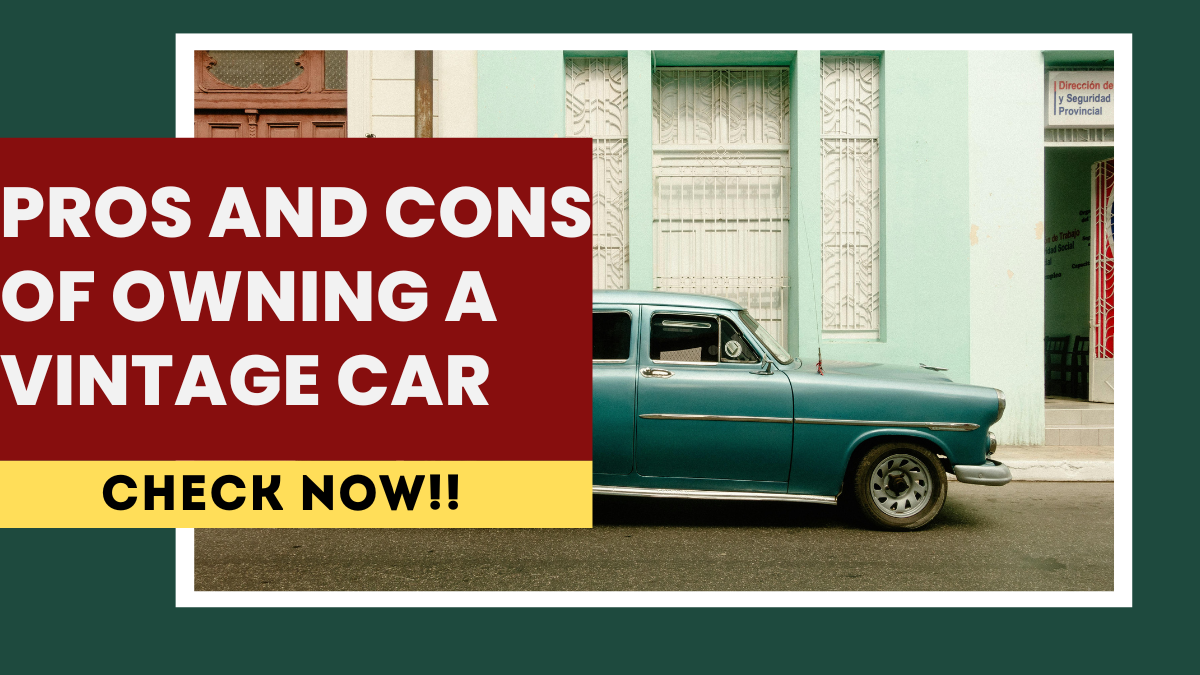Owning a vintage car is often described as a dream come true for enthusiasts. These vehicles carry the charm of a bygone era, with designs, sounds, and experiences modern cars can never replicate. Yet behind the glossy paintwork and nostalgic appeal, there are real responsibilities and challenges that come with classic car ownership. For anyone considering purchasing a vintage automobile, it is important to carefully weigh the pros and cons of owning a vintage car. This detailed guide will help potential buyers make an informed decision, balancing passion with practicality.

The Advantages of Owning a Vintage Car
There are several reasons why collectors and enthusiasts are drawn to vintage vehicles. Beyond their visual beauty, they offer unique experiences and financial opportunities.
1. Timeless Design and Aesthetic Value
Vintage cars were built in an era when design was as important as engineering. Sleek curves, chrome detailing, and handcrafted interiors make them stand out from today’s mass-produced vehicles. Driving or displaying a vintage car turns heads instantly and creates conversations wherever you go.
2. Investment Potential
Unlike modern cars that depreciate quickly, well-maintained vintage cars often appreciate in value over time. Rare models, limited editions, or historically significant vehicles can deliver strong returns. With the growing interest in collectibles, many investors now see vintage cars as assets similar to art or real estate.
3. Driving Experience and Nostalgia
Modern cars are filled with electronics, but vintage cars provide a raw, mechanical feel. The growl of a carbureted engine, the heavy steering wheel, and the manual gearshift create a driving experience unlike anything today. For older generations, these cars bring back memories of youth, while younger drivers often admire the authenticity.
4. Sense of Community
Owning a vintage car opens doors to car clubs, exhibitions, rallies, and auctions. Enthusiasts share tips, stories, and resources, creating strong social connections. For many collectors, the community aspect is just as rewarding as the car itself.
5. Pride of Ownership
Restoring and maintaining a vintage car requires time and effort, but the reward is immense. Knowing that you have preserved a piece of history brings pride, and showing it at events creates a sense of accomplishment.
The Disadvantages of Owning a Vintage Car
While the advantages are appealing, the reality of ownership also comes with challenges. Understanding these classic car ownership challenges is crucial before making a commitment.
1. High Maintenance and Repair Costs
Vintage cars require constant care. Parts are often rare, expensive, and sometimes need to be custom-made. Regular servicing can also cost far more than maintaining a modern vehicle. Collectors must budget not only for purchase but also for ongoing upkeep.
2. Reliability Concerns
Unlike modern vehicles that are designed for daily use, vintage cars can be unreliable. Breakdowns are more frequent, and roadside assistance may not always be able to handle older mechanical systems. Long-distance trips often require careful planning.
3. Lack of Modern Comforts
Vintage cars lack many conveniences such as air conditioning, power steering, advanced braking systems, and infotainment features. While enthusiasts see this as part of the charm, it can be inconvenient for those used to modern driving standards.
4. Safety Limitations
Older vehicles were not built with modern safety standards. Features such as airbags, crumple zones, or ABS brakes are absent. Driving a vintage car on modern highways requires caution and awareness of its limitations.
5. Storage and Insurance Challenges
Vintage cars need special storage conditions to avoid rust and deterioration. A climate-controlled garage is ideal, but not always affordable. Insurance is also different; specialty vintage policies are required, which may limit mileage or usage.
Balancing the Pros and Cons
The decision to buy a vintage car depends on personal priorities. For those who value nostalgia, uniqueness, and investment potential, the advantages outweigh the challenges. However, for someone seeking daily reliability and convenience, the disadvantages may prove frustrating. Many collectors solve this by keeping vintage cars for weekend drives, shows, or as investment pieces, while relying on modern cars for daily use.
Tips for First-Time Buyers
If you are considering your first vintage car, follow this advice to avoid common mistakes:
-
Research models thoroughly and understand their history.
-
Always get a professional inspection before purchase.
-
Join a car club to learn from experienced collectors.
-
Start with a relatively affordable and easy-to-maintain model such as a classic Mini, Volkswagen Beetle, or Ford Mustang.
-
Be prepared for ongoing expenses beyond the initial purchase.
Emotional vs Practical Ownership
For many, vintage cars are not just machines but emotional investments. The joy of seeing a beautifully restored classic in your garage or driving it on a sunny day often outweighs the practical downsides. Still, potential buyers must decide whether they are looking for a collectible piece of history or a daily driver. Owning a vintage car is best approached as a lifestyle choice rather than a purely financial decision.
Final Thoughts
The pros and cons of owning a vintage car show that these vehicles are both treasures and challenges. They offer timeless design, community, and financial potential, but they also demand patience, money, and careful care. Ultimately, owning a vintage car is about passion. For those who embrace the journey, every maintenance bill, every show, and every mile driven becomes part of a rewarding experience that few other hobbies can match.
FAQs
Are vintage cars a good investment for beginners?
Yes, but beginners should start with affordable models that have available parts and strong market demand, avoiding overly rare or complex cars.
How much should I budget annually for vintage car maintenance?
Depending on the model, expect to spend anywhere between $3,000 and $10,000 per year on upkeep.
Can vintage cars be driven daily?
While possible, it is not recommended due to reliability issues, lack of safety features, and wear from modern traffic conditions.
Do vintage cars require special insurance?
Yes, most insurers offer classic car policies with agreed value coverage and limited mileage options tailored for collector vehicles.
Click here to know more.
